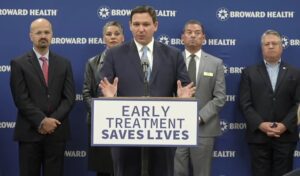 Governor Ron DeSantis called on President Joe Biden’s administration to “release the stranglehold on life-saving monoclonal antibody treatments for COVID-19” through its allocation system and increase the supply distributed to Florida or allow states to purchase the antibodies directly.
Governor Ron DeSantis called on President Joe Biden’s administration to “release the stranglehold on life-saving monoclonal antibody treatments for COVID-19” through its allocation system and increase the supply distributed to Florida or allow states to purchase the antibodies directly.
Recently, the Biden Administration announced it would be halting distribution of Regeneron and Eli Lilly monoclonal antibody treatments to states, but in response to a letter from Surgeon General Dr. Joseph Ladapo, the administration reversed its decision allowing states to continue to order these treatments through the allocation system. However, Florida needs at least 30,000 more doses per week than it is receiving through the allocation system to expand capacity at existing monoclonal antibody treatment sites and open new sites to treat 250-300 patients per day at each site.
“Prior to the federal government takeover of the monoclonal market, Florida successfully distributed approximately 30,000 doses per week when we managed our own supply,” said Governor Ron DeSantis. “The state has more than $800 million available to quickly deploy monoclonal antibody treatments throughout the state, and the only thing holding us back is the insufficient supply of treatment from the federal government. After failing to ‘shut down the virus,’ the Biden Administration has come to the realization that there is not a federal solution to COVID-19, and releasing the federal stranglehold on these effective treatments is a good first step.”
“Since early 2020, the Florida Department of Health has responded to COVID-19 around the clock, and has been at the forefront of innovation,” said Surgeon General Joseph Ladapo, MD, PhD. “While I am pleased to see that HHS has reversed its decision to pause shipments of Regeneron and Eli Lilly’s monoclonal antibody therapy treatments following my letter to Secretary Becerra, this is just the first step. Direct access to early treatment is essential to saving lives – it is not an option nor should it be barricaded by bureaucracy. Under the leadership of Governor DeSantis, the Florida Department of Health continues to work with the Division of Emergency Management to efficiently and continuously prepare for the availability for additional monoclonal antibody treatments, should the federal government change tact and allow states to directly protect their communities.”
“Governor DeSantis has been instrumental in securing these lifesaving resources for Floridians,” said Florida Division of Emergency Management Director Kevin Guthrie. “The Division knows how important increasing access to this treatment is and we stand ready to mobilize sites as quickly as possible. We look forward to continuing our support for our state and local partners as they respond to COVID-19 in their communities.”
“Throughout the pandemic Governor DeSantis’ Seniors First strategy has saved the lives of countless seniors and other vulnerable individuals in our long-term care facilities,” said Agency for Health Care Administration Secretary Simone Marstiller. “I am grateful to Governor DeSantis for continuing to push the federal government to provide more of these important lifesaving therapeutics. We don’t want people to be afraid, we want people to be able to make the right decisions and we want them to have the right information on which to make those decisions.”
Florida pioneered the widespread use of monoclonals and educated the public, and in some cases medical professionals, about the success of this treatment in preventing serious illness and hospitalizations for both vaccinated and unvaccinated Floridians. Over the summer, the state set up dozens of monoclonal antibody sites and Governor DeSantis traveled across Florida to make it known that early treatment saves lives.
Instead of allowing other states to follow Florida’s lead to provide this lifesaving treatment to their citizens, the Biden Administration decided to take full control of the supply of monoclonals, then dramatically cut Florida’s supply. To help fill the gap caused by this cut in allocation, Florida worked with GlaxoSmithKline to bring thousands of doses of another monoclonal to Florida, but the Biden Administration took control of this treatment as well.
In anticipation of the potential for a future COVID-19 surge causing an increase in demand for early treatment, the Florida Division of Emergency Management (FDEM) requested and received additional resources from the Legislature in October, including:
- $245 million to support ongoing monoclonal antibody treatment operations throughout the state at the time; and
- $643 million for any future surge in demand for monoclonal antibody treatment, including the potential future opportunity for the state to directly purchase monoclonal antibody treatments and bypass the federal government.
Thanks to this proactive approach, FDEM has more than $800 million remaining and available to quickly deploy monoclonal antibody treatments throughout the state once the state is permitted to directly purchase monoclonal antibody treatments from the distributor.
To find locations to receive monoclonal antibody treatments around the entire state, visit floridahealthcovid19.gov.


